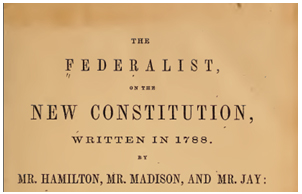
Source: The Federalist 1857, Library of Congress

Source: The Federalist 1857, Library of Congress
The series of essays that make up the Federalist Papers go far beyond the specific objections of the Anti-Federalists and express a broad-based defense for every aspect of the Constitution, from checks and balances to its version of federalism.
In this section, you will look at perhaps the most famous essay of the 85, Federalist #10. The three authors of the Federalist Papers, Madison, Hamilton, and Jay, wanted their identities to remain a secret, so they signed all of the essays "Publius," who was a famous Roman leader known as a “friend of the people.” For Federalist #10, Publius was James Madison.
The Anti-Federalists feared the power of a strong central government and preferred to have power concentrated in the states. In Federalist #10, Madison responded by arguing that such an arrangement would actually be more likely to result in tyranny, not less.
He argued that the biggest danger to a republic is the rise of what he called a majority faction. A faction is a group of people united by a common interest. If such a group became a majority, they could consistently outvote everyone else and do whatever they wanted. In other words, they could create a “tyranny of the majority.”

Source: Dallas Cowboys Helmet 1964, Wikimedia
As an example, Dallas Cowboys fans could be considered a faction. If they became a majority, they might ban the sale of Houston Texans jerseys and clothing for any other NFL team. They might make Troy Aikman’s birthday a national holiday.
Madison claims that having sufficient power in a national government is better than relying on smaller states because the large republic is the solution to the problem of majority faction. Interactive popup. Assistance may be required. The smaller the society, the fewer probably will be the distinct parties (groups of people) and interests composing it; the fewer the distinct parties and interests, the more frequently will a majority be found of the same party; and the smaller the number of individuals composing a majority . . . Extend the sphere (Make a larger society), and you take in a greater variety of parties and interests; you make it less probable that a majority of the whole will have a common motive to invade the rights of other citizens; or . . . it will be more difficult for all who feel it to discover their own strength, and to act in unison (together) with each other.
Publius to read an excerpt from Federalist #10 and answer the questions that follow in your notes.
to read an excerpt from Federalist #10 and answer the questions that follow in your notes.
 .
. .
. .
. .
. By a tyranny of the majority, Madison does not mean that a majority of the people should never come together. Otherwise, no legislation would ever get passed. The idea is that, depending on the issue, different groups of factions would have to come together to form a majority. Such an alliance would be temporary and depend on the issue. Nobody would oppress each other because they would know that they could be in the minority when the next issue comes around.
By a tyranny of the majority, Madison does not mean that a majority of the people should never come together. Otherwise, no legislation would ever get passed. The idea is that, depending on the issue, different groups of factions would have to come together to form a majority. Such an alliance would be temporary and depend on the issue. Nobody would oppress each other because they would know that they could be in the minority when the next issue comes around.
 People wonder whether the United States still enjoys the benefits of an extended sphere today. Although the country is much larger than it was in 1787, the rise of social media like Facebook and Twitter has made it easier for people with common interests to find each other. Some people argue that this makes the rise of a majority faction more likely.
People wonder whether the United States still enjoys the benefits of an extended sphere today. Although the country is much larger than it was in 1787, the rise of social media like Facebook and Twitter has made it easier for people with common interests to find each other. Some people argue that this makes the rise of a majority faction more likely.
 The counter-argument is that more social media simply means more factions. Facebook and Twitter have made it so that anyone with any interest can find each other, splitting the country further and making it less likely to have a majority faction.
The counter-argument is that more social media simply means more factions. Facebook and Twitter have made it so that anyone with any interest can find each other, splitting the country further and making it less likely to have a majority faction.
In either case, the Bill of Rights exists to protect the people.